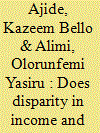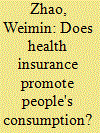|
|
|
Sort Order |
|
|
|
Items / Page
|
|
|
|
|
|
|
| Srl | Item |
| 1 |
ID:
159078


|
|
|
|
|
| Summary/Abstract |
Exploiting the variations in household income and consumption structure, this paper corrects the measurement errors of consumption expenditure reported by households in different income classes. By using the Urban Household Survey (UHS) data, empirical results demonstrate that consumption inequality in urban China increased by 67% during the sample period and it was much larger than 36%, which was obtained directly from the reported raw data. Precisely, from 1993 to 2007, the consumption inequality experienced a rapid increase, but began to decrease after 2008. Since 2002, underreporting of consumption expenditure was more evident for households with higher income. Furthermore, the consumption inequality in central and western regions, and that of the households with higher education levels were more serious and constituted important driving forces for the increase of consumption inequality.
|
|
|
|
|
|
|
|
|
|
|
|
|
|
|
|
| 2 |
ID:
182528


|
|
|
|
|
| Summary/Abstract |
Does disparity in income and consumption incite terrorism in Africa? To answer this important question, we investigate the empirical linkages between inequality and terrorism by separately regressing income and consumption inequalities on four indicators of terrorism: domestic, transnational, unclear, and total over the period 1980–2012. Employing a negative binomial regression across a panel dataset covering 46 African economies, the following findings are established. First, both income and consumption inequalities have decreasing impacts on all terrorism measures—with the exception of uncertain terrorism (the impact of which is negligible). Second, both income and consumption inequalities exert more statistical influence on transnational terrorism than domestic terrorism. Third, income inequality exerts more statistical weight on terrorism measures than consumption inequality across the model specifications. Last, the non-trivial impact of confounding variables—such as the lagged value of terrorism, surface areas, and conflicts—are validated across the terrorism models. In line with these empirical outcomes, policy implications and suggestions for further studies are offered.
|
|
|
|
|
|
|
|
|
|
|
|
|
|
|
|
| 3 |
ID:
163507


|
|
|
|
|
| Summary/Abstract |
In order to change the situation that reimbursement rate of the new rural cooperative medical care system (NCMS) was too low to alleviate farmers medical burden, in August 2012, China began to expand the coverage of the NCMS to include the treatment of critical illnesses. Could more effective health insurance promote the consumption of rural residents? We studied the impact of the critical illness insurance (CII) on rural household consumption, and find that the CII increases per capita household daily consumption by >15%. But healthcare and medical expenditures have not been affected. Our comparison of outcomes for households with different levels of consumption and income shows the CII mainly promote the consumption of rural affluent family, but no incentive for poor family, resulting in deterioration of consumption inequality of rural households. The finding is robust to various alternative hypotheses and specifications.
|
|
|
|
|
|
|
|
|
|
|
|
|
|
|
|
|
|
|
|
|